How marketing departments, rather than IT, are driving big data adoption
Marketing departments could soon start overtaking IT in terms of interest and investment in big data, argue experts

Data driven marketing was the big talking point at this week's Teradata Partners Conference and Expo taking place in Nashville, Tennessee, with experts highlighting the need for data and analytics to combine with marketing to drive businesses forward and connect them with customers.
"It's very difficult for people to keep [digital marketing] as a separate discipline," Ruth Gordon, director of digital marketing for Teradata, says. "Marketing is becoming digital, so to consider it in isolation just as a channel rather than marketing generally is quite difficult."
Marketing vs. IT
As organisations become more customer centric, she continued, big data has entered the realm of marketing just as much, if not more so, than IT. As a result, it's conceivable that CMOs could soon be investing just as much in big data technology as CTOs.
Teradata applications CMO, Lisa Arthur, also weighed in on the merging between marketing and IT. "The first step has to be strategy, and what we see is that this is coming top down but it also needs to be driven bottom up. That becomes very important because this transformation cannot be delegated it can't be just, go figure it out.' Marketing really transcends many functions in the business."
There is a danger marketing officers will collect data without knowing how to make the most of it, which can have an impact on how much time, energy and resources businesses are willing to spend on exploring the world of big data.
"Many CMOs are really focusing at the moment on trying to understand the value of it so that they can justify their spend," Gordon says. "There's been a real shift and one of the really hot topics, I guess, is attribution of marketing spend and really trying to understand every single interaction a customer has with a business.
There is however, as Gordon acknowledges, much greater room for error if marketers and IT departments don't sufficiently communicate with one another.
Get the ITPro. daily newsletter
Receive our latest news, industry updates, featured resources and more. Sign up today to receive our FREE report on AI cyber crime & security - newly updated for 2024.
"There is a danger that you can have a team of people creating amazing models and finding amazing insights about customers, and then there not being that communication with the marketing department... But I think that's a thing of the past as analytics has become more important to marketing."
"The big data opportunity, where I feel it is for big brands, is that we have to get this right," Arthur adds. "Seventy per cent of marketers [are] planning a big data implementation in the next two years.
"Their fear is that marketing is going to do that alone as a silo, and won't have the optics of the insights or the analytics, and then within the company tarnish the value of big data. In this, it's really important that marketing does not do it alone."
Determining Value
Although big data is a significant trend for organisations right now, the most successful examples are using data from all channels available to them, differentiating what information is and isn't useful to them.
"Obviously data is very important in understanding or being able to do attribution," Gordon explains. "But you have to collect data for every one of those interactions and all of your ad impressions and everything else, pull that all together and then be able to do the analytics to understand the sequencing of those things and the important of each of those interactions.
"I would say probably 80 per cent of the people I'm having conversations with would put that as a top three priority."
Arthur adds: "I'm not looking at big data as just new data, web logs and social networks, I'm looking at big data for marketing being all of the data. The new data and the traditional data."
Of the industries doing the most interesting things with big data and data analytics, Arthur cited financial services and retail, which both have had to navigate high levels of competition and uncertain economic conditions.
"As we think about financial services," she says, "they need to be more customer-centric, not pushing and redefining those products, and how they arbitrate that across a broader, diverse business."
Continues over page...
- 1
- 2
Current page: How marketing departments, rather than IT, are driving big data adoption
Next PageCaroline has been writing about technology for more than a decade, switching between consumer smart home news and reviews and in-depth B2B industry coverage. In addition to her work for IT Pro and Cloud Pro, she has contributed to a number of titles including Expert Reviews, TechRadar, The Week and many more. She is currently the smart home editor across Future Publishing's homes titles.
You can get in touch with Caroline via email at caroline.preece@futurenet.com.





